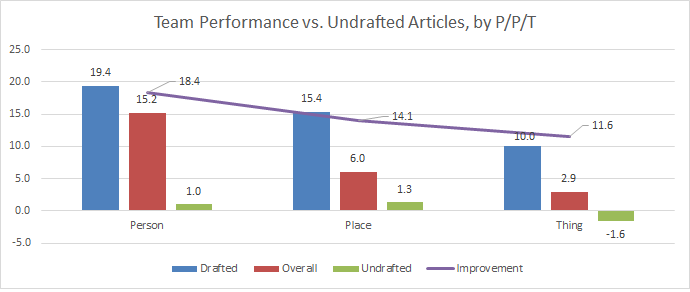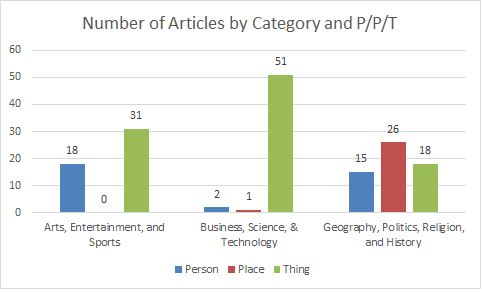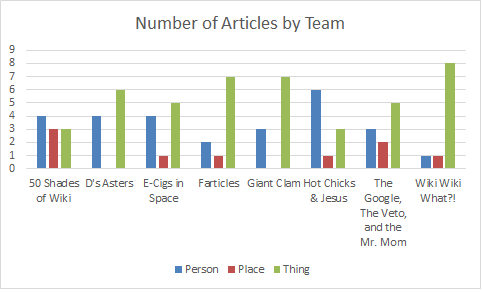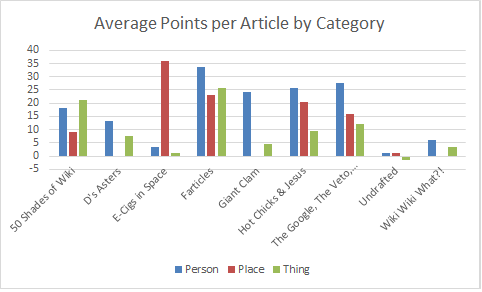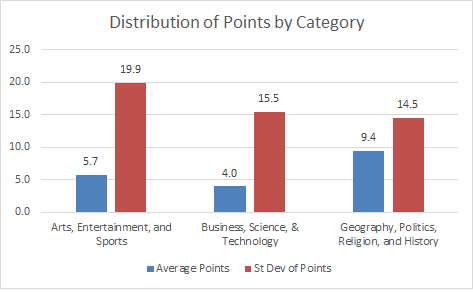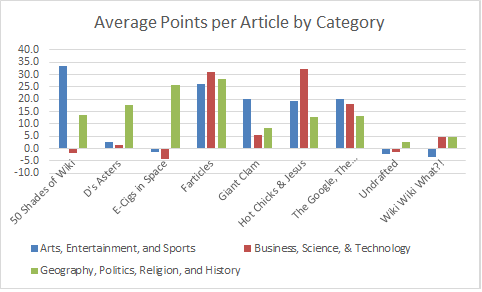Fantasy Wikipedia 2015 was a success! Here are all its blog posts so you can navigate them:
Description / Rules:
Introduction
Rules
The Fantasy Wikipedia 2015 Draft Pool
Teams:
Summary of Teams
Team 1: Giant Clam
Team 2: Hot Chicks and Jesus
Team 3: 50 Shades of Wiki
Team 4: Farticles
Team 5: E-Cigs in Space
Team 6: The Google, The Veto, and the Mr. Mom
Team 7: Wiki Wiki What?!
Team 8: D's Asters
Final Analysis:
Tiered Team Performance
Performance of Undrafted Articles
Performance by Category
Performance by People Places and Things
Monthly Review Summaries:
January
February
March
Weekly: Look Ahead and Week in Review:
Ahead: 1/1-1/3
Review: 1/1-1/3
Ahead: 1/4-1/10
Review: 1/4-1/10
Ahead: 1/11-1/17
Review: 1/11-1/17
Ahead: 1/18-1/24
Review: 1/18-1/24
Ahead: 1/25-1/31
Review: 1/25-1/31
Ahead: 2/1-2/7
Review: 2/1-2/7
Ahead: 2/8-2/14
Review: 2/8-2/14
Ahead: 2/15-2/21
Review: 2/15-2/21
Ahead: 2/22-2/28
Review: 2/22-2/28
Ahead: 3/1-3/7
Review: 3/1-3/7
Ahead: 3/8-3/14
Review: 3/8-3/14
Ahead: 3/15-3/21
Review: 3/15-3/21
Ahead: 3/22-3/28
Review: 3/22-3/28
Ahead: 3/29-3/31
Review: 3/29-3/31
Saturday, May 2, 2015
People Places and Things
I'm considering an alternative category for the next Fantasy Wikipedia (if there ever is one). Instead of the three that were used, I'm considering People, Places, and Things. Here are the strict definitions:
Person (a living person; e.g., Ruth Bader Ginsburg or Kim Jong-Un)
Place (a named place on Earth you can visit; e.g., Wichita or Lake Michigan, but not the Moon).
Thing (anything not above, including dead people or groups of people such as Michael Jackson or Koch Industries (corporations are not people))
Most of the articles in Fantasy Wikipedia 2015 were Things. Here is a summary of how these articles performed, by category:
Person: This was the category with the highest points, by far. The players expected this during the draft. 77% of "Person" articles were drafted compared to 33% of Places and 39% of Things.
Place: The least popular category, with only 33% drafted, but with higher average points than Things.
Thing: The lowest scoring category, but since there are so many, and their variance (standard deviation) was higher than Places, they were more popular, with 39% drafted.
Here is how the teams did against the "undrafted" articles:
Pretty reasonable; the teams did a slightly worse job in the "Thing" category, though, where there was the lowest performance. I checked on this to see if perhaps there was a reason that teams had to select the lower scoring "Thing" articles. Most likely, it's because they are consolidated in the "Business, Science, & Technology" category, where each team had to have at least two articles:
It makes sense that "Place" articles would be exclusively in the "Geography, Politics, Religion, and History." The only "Place" in Business, Science, & Technology is Silicon Valley, which was one of the best articles in Business, Science, & Technology. The two "People" in Business, Science, & Technology are Stephen Hawking and Bill Gates, one of which scored perfect due to his association with the Oscars, and the other which was -5 points. This goes with the theme above that there is high variance among "People" articles.
Next time, even if I don't use these categories, I will make sure to control for person/place/thing as well as the categories above. E.g., rather than having Apple, Inc. and Facebook, I could have used Tim Cook and Mark Zuckerberg.
For the record, here are the counts of articles by team:
2nd place Hot Chicks & Jesus strongly favored People, while 50 shades of Wiki and The Google, The Veto, and the Mr. Mom all had over-representation on Places. Both 1st place Farticles and 8th place Wiki Wiki What?! had a high number of "thing" articles.
Here is average article performance by person/place/thing and team:
Person (a living person; e.g., Ruth Bader Ginsburg or Kim Jong-Un)
Place (a named place on Earth you can visit; e.g., Wichita or Lake Michigan, but not the Moon).
Thing (anything not above, including dead people or groups of people such as Michael Jackson or Koch Industries (corporations are not people))
Most of the articles in Fantasy Wikipedia 2015 were Things. Here is a summary of how these articles performed, by category:
Place: The least popular category, with only 33% drafted, but with higher average points than Things.
Thing: The lowest scoring category, but since there are so many, and their variance (standard deviation) was higher than Places, they were more popular, with 39% drafted.
Here is how the teams did against the "undrafted" articles:
Pretty reasonable; the teams did a slightly worse job in the "Thing" category, though, where there was the lowest performance. I checked on this to see if perhaps there was a reason that teams had to select the lower scoring "Thing" articles. Most likely, it's because they are consolidated in the "Business, Science, & Technology" category, where each team had to have at least two articles:
It makes sense that "Place" articles would be exclusively in the "Geography, Politics, Religion, and History." The only "Place" in Business, Science, & Technology is Silicon Valley, which was one of the best articles in Business, Science, & Technology. The two "People" in Business, Science, & Technology are Stephen Hawking and Bill Gates, one of which scored perfect due to his association with the Oscars, and the other which was -5 points. This goes with the theme above that there is high variance among "People" articles.
Next time, even if I don't use these categories, I will make sure to control for person/place/thing as well as the categories above. E.g., rather than having Apple, Inc. and Facebook, I could have used Tim Cook and Mark Zuckerberg.
For the record, here are the counts of articles by team:
2nd place Hot Chicks & Jesus strongly favored People, while 50 shades of Wiki and The Google, The Veto, and the Mr. Mom all had over-representation on Places. Both 1st place Farticles and 8th place Wiki Wiki What?! had a high number of "thing" articles.
Here is average article performance by person/place/thing and team:
Category Performance
Here are some details on the Fantasy Wikipedia 2015 categories.
There were three categories in Fantasy Wikipedia 2015. The chart below shows the average point value for articles in the draft (regardless of whether they were selected by a team or not):
There were three categories in Fantasy Wikipedia 2015. The chart below shows the average point value for articles in the draft (regardless of whether they were selected by a team or not):
A few points from this chart:
Geography, Politics, Religion, and History was the easiest category for players to find points. It had the most points per article on average, and the lowest standard deviation among articles.
Arts, Entertainment, and Sports was an important category for the drafters to get correct: it had the highest deviation among articles. This means that there was a big difference between the good picks and the bad picks.
Business, Science, & Technology was the "hard" category. It had the lowest average point value, and not very high standard deviation either. There were not many opportunities in this category.
The chart below shows how the teams' "drafted" articles performed against the "undrafted" articles:
The drafters showed the most "improvement" on Arts, Entertainment, and Sports. This category has the highest difference (18.1) between the average drafted score (15.7) vs. average undrafted score (-2.4). This is probably unsurprising; this is the category with the highest variance (see previous chart).
The other two categories are about the same, in terms of "improvement." The highest points were left behind on Geography, Politics, Religion, and History, but this is also where there was the most opportunity. In general, the players favored this category with their picks: 53% of articles from this category were drafted, but only 44% of articles from the other two categories were drafted. The players rightly saw that there was a lot of opportunity in this category.
Last, here is average article performance, by team and by category:
Subscribe to:
Posts (Atom)

